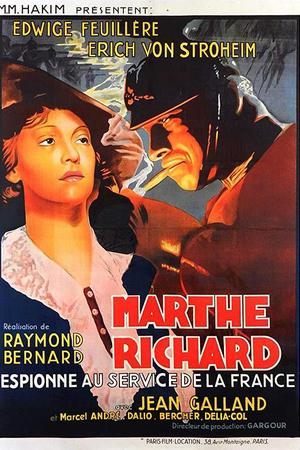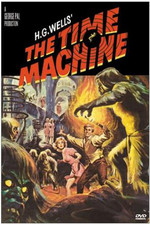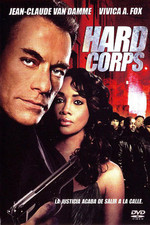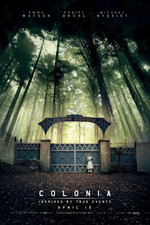
Marthe Richard au service de la France
(1937)2022-03-08 更新 2022-03-08 创建
导演: 雷蒙·贝尔纳
主演: 艾薇琪·弗伊勒 / Délia Col / 玛尔特·梅洛 / Liliane Lesaffre / 埃里克·冯·施特罗海姆 / 让·加朗 / 马塞尔·安德烈 / 勒内·贝热龙 / 马塞尔·达里奥 / Fernand Bercher / 克里斯蒂安·阿让蒂 / Georges Saillard / Pierre Juvenet / Jacques Berlioz / Joffre / Lucien Blondeau / Jacques Henley / Ernest Ferny / Fichel
上映时间: 1937
又名: Marthe Richard
剧情简介
1937法国剧情片《Marthe Richard au service de la France》由雷蒙·贝尔纳导演,艾薇琪·弗伊勒主演,影片讲述的是:
At the start of the First World War Marthe Richard sees her parents arrested by German soldiers taken away and shot When she loses contact with her fiancé André a soldier on the Western Front the young woman hastens to Paris with one thought in her mind – to take revenge on the Germans by serving her country She is ...[显示全部]engaged by Commandant Rémond to work as a spy She is sent to SaintSébastien in Spain to make contact with two senior German officers von Ludow and von Falken Von Ludow is easily seduced by Marthe’s charms and offers her work as a spy Having gained the confidence of her enemies Marthe stands every chance of fulfilling her mission to determine the whereabouts of a hidden submarine base However von Ludow’s mistress Mata Hari sees Marthe as a rival and sets out to thwart her mission
Marthe Richard au service de la France is one of three films by director Raymond Bernard which were set at the time of the First World War The other two were Les Croix de bois 1932 and Les Otages 1938 The film is based on the memoirs of Marthe Richard who as a young woman worked as a spy for the French during WWI Richard would later became a leading campaigner against prostitution in France a staunch supporter of the law that would result in the closure of brothels in 1946
The main attraction of this film is its cast The part of Marthe Richard is played by Edwige Feuillère an engaging and very talented actress who was one of the stars of French cinema in the 1930s and 1940s Her costar is the impressive Erich von Stroheim who had established himself as an actor in Hollywood after an inspired but largely unsuccessful career as a film director This was the first of around half a dozen French films which von Stroheim starred in before his return to the United States at the start of World War II It was immediately followed by La Grande illusion in which von Stroheim again plays a German officer during WWI arguably the actor’s most memorable film role At the time von Stroheim could not speak French and had to learn his lines phonetically but that did not prevent him from giving a powerful intensely human performance
Unlike most of Raymond Bernard’s films Marthe Richard au service de la France has not aged well This is partly to do with the quality of the special effects – the airsea battle sequence at the end of the film was clearly too ambitious to be realised convincingly with the available resources and looks risible compared with comparable Hollywood offerings of the period However what most dates the film is its flagrant appeal to nationalism In contrast to Bernard’s earlier WWI film the excellent Les Croix de bois it shows a grotesquely idealised view of war with John Buchanstyle heroes bloodless conflict and no end of flagwaving crowds Obviously the film was an appeal to patriotism as a time when war in Europe looked imminent when a more realistic approach would have been a much harder sell It is interesting to compare this with Bernard’s next film Les Otages also set during World War I Whilst this later film also takes a patriotic line it does so in a far more subtle way whilst giving a more honest and convincing portrayal of the horrors of war
One of the main themes of Marthe Richard au service de la France is the question of identity of people not realising who the real enemy is during a period of crisis Bernard seems to be strangely prescient of the problems that would beset the French nation when it fell under German occupation in the early 1940s a time when no one could know for certain who was a collaborator or who was a resistance supporter a time when persecuted minorities and freethinkers had to conceal their identities or face deportation to the Nazi death camps This would provide the subject for Raymond Bernard’s Un ami viendra ce soir 1946 the first film he made after a period of obscurity during the Second World War one of his darkest and most interesting films ~ James Travers
下载地址











 来信,我们会及时处理和回复,谢谢
来信,我们会及时处理和回复,谢谢